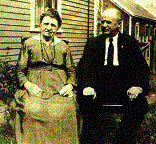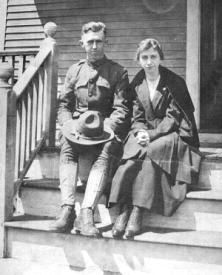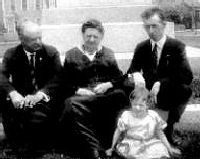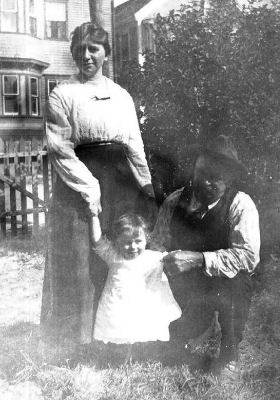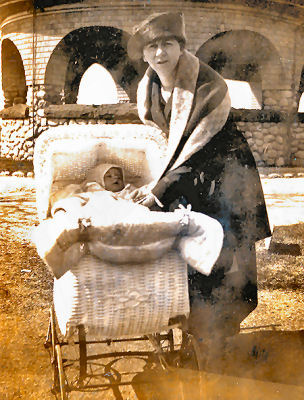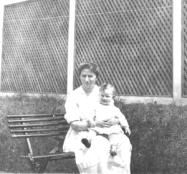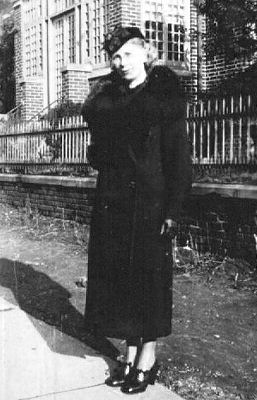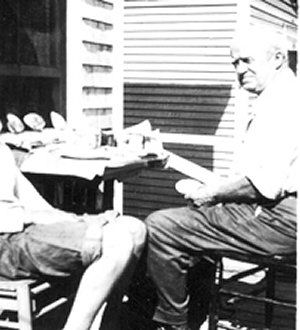|
The house was big, high and lots of stairs.
It had a porch on all three floors that covered the back of the house and
part of the side entrance. It was a
great place to play when it rained and to sit and read on the porch swing.
It had a fence across the entrance so that the babies could play with no
danger.
Every summer we would go swimming down at the river. Our neighbor owned a
boathouse. The bottom part of the house was like a garage where the boat was
kept with lots of storage space. All
the kids in the area would go to the boathouse.
The neighbor fixed an area where we could change into our swimsuits.
I guess we must have been well behaved.
I don’t recall any problems and they let us come every time the tide
was high. Near the shore were three
huge rocks, which we called the 3-sisters.
The neighbor’s children had won all kinds of awards for distance
swimming. Every summer there would
be a 6-mile Race from Sandy Beach to Bliffen Beach. The neighbor tried to teach
me to swim, but I was a hopeless case. When
it was time to go home, Auntie, who lived in the second floor above my family,
would call my cousin, Georgie. We
could hear her all the way down at the river and then, about l5 minutes later,
she would see all the heads coming up the hill.
Summers were very enjoyable for me. |
|
We did not have all the conveniences at home that we
have today. To keep food cold, we
had an icebox and in the summertime the iceman would come with a big truck full
of blocks of ice. When
my mother needed a block of ice, she would put a card in the window and the
iceman would deliver it. And every
night, my father would have to empty the pain of melt water from under the box.
In the wintertime, he built a box that was placed outside the pantry
window and it kept the food cold all winter.
Milk was not pasteurized yet and the cream would push up from the neck of
the bottle.
My father was working for the electric company and
before we moved, we had an electric refrigerator. He
worked a 12-hour shift daily, changing monthly from days to nights and vice
versa.
We did have an electric washing machine, but dryers
were not invented yet. We
finally got a radio and listen to the news and stories.
My father received a telephone for his birthday from Aunt Rosie, but no
one I knew had a phone. We also went to Sandy Beach. We could take the trolley on Bay Street, where we lived,
right to the beach. It had all the
rides and also a roller coaster that everyone liked but me. It made a nice outing and not too far from home.
The beach was located right on the Rhode Island and Massachusetts State
Line. Several years before we left
Bay Street, they built huge gasoline tanks nearby and the beach was ruined but
no one paid attention to complaints back then either.
In the wintertime, it used to snow a lot and we would
go sledding on the side street by the house.
There were not too many cars then so we would really have a good time.
My mother was a good sport and would come out and slide with us.
She was one of the younger mothers and all the kids loved her.
We also went ice-skating on the millpond not far from home.
It could get real cold and you never seemed to be dressed warm enough
even though we had ski pants and heavy jackets.
One thing about the pond, you could only skate on the far eastern part of
the pond because near the building the water was warm.
I don’t imagine they let anyone skate on that pond today. We didn’t have too many rules and regulations like they do
now. But we were careful and had
fun and lived through it all.
One of the boys owned a bobsled.
It was a long board that seated about ten people and the leader would
steer the sled down the road with one ice skate.
Some one would direct traffic at the bottom of the hill because there was
no way of stopping the sled. Now as
I look back, it was very dangerous, but very exciting and lots of fun.
We had to make our own games to play. We played dodge
ball, marbles, jump rope, jacks; jackknife. etc., and I did a lot of
reading, especially when I could borrow a Nancy Drew book. The porch
swing was a great place to read and behind it was a honeysuckle bush that
smelled so good all summer long. Also,
since I was the oldest and the only girl with four brothers, I did a lot of
brother sitting. Johnny was the
oldest, and then came Leo, Tommy, and Billy.
Leo and
Tommy were no problem, but Billy could always
find some mischief to get into. He
was a handful to watch. You
must remember that we did not have TV in those days. Before we got our own radio,
my mother and I used to sit on the back stairs in the entryway and listen to the
radio coming from my aunt’s tenement. When we did finally get a radio, we could listen to all the
news and found many stories and comedians that we enjoyed. |
|
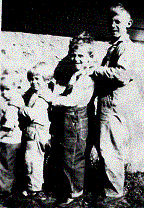
The four brothers |
Shopping, except for groceries, was no problem.
We would just take the trolley to where the department stores were on
Main Street. McWhirrs and Cherry & Webb were the main stores where clothing
of any kind could be found. My
Uncle Al Poirier had his Optical Office in McWhirrs for many years.
McWhirrs was very old fashioned, but it had everything you could possible
need. Then there were F. W.
Woolworth’s 5 and 10 cents store, and J.J. Newberry’s where I went to work
when I was in High School. It was
fun just to walk around any of these stores.
They had just about anything you can imagine to buy for a nickel.
|
|
Grocery shopping was something else. We had
a little red wagon just for grocery shopping.
My father would go about once a week with a long list to buy.
He would take the wagon and either Johnny or I. with him and pull us in
the wagon about a half a mile to an A & P Grocery Store. (A forerunner to a
super market.) The Store was very narrow but quite deep.
My father would take his list out and tell the clerk each item and the
clerk would get it. Some times he had to climb up a ladder if the item was high
up the wall. Everything went into a
box and in the wagon. And with a
candy treat, we would go home.
It was in 1930 that my father bought his first car.
It was a Model A Ford, stick shift, isinglass windows that you could roll
down when it rained. The tires were
very skinny. You could count on a
rough ride, as the car had few springs. To get the engine started, you had to
crank the engine from the outside in the front of the car.
It was always an adventure when you went for a ride. After my father learned to drive, we used to go to Newport
Second Beach, about 20 miles from home. We
would drive on the beach at low tide and we had to stay until it was low tide
again to drive off the beach. My
mother cooked hot dogs for us on a Sterno stove.
With five kids, it wasn’t much fun for her, but my father really
enjoyed the ocean and relaxation. And
we kids sure had fun playing in the surf of the Atlantic Ocean at Newport, RI.
When I was about 13, my mother’s mother, Mimi came to
live with us. At the time, I was
sleeping on the couch in the dining room. My
folk had to replace the dining room set for a single bed for me. Mimi had her
own bed to bring down from Auntie’s who lived on the second floor.
Mimi had a disagreement with Auntie and decided she didn’t want to live
with her anymore. Well, Mimi stayed about three months, decided my father was
too strict, made peace with Auntie and moved back upstairs to her apartment.
That bed of mine is still around, it’ll be an antique if we keep it
long enough.
For two summers, 1934 and 1935, we spent a month at
Ocean Grove across the Taunton River. We
rented a tiny cottage with everything furnished.
It was great. The water at high tide would come right under the house,
which was built on pilings. I was
only a teenager and it was just wonderful to get away from the city and to go
swimming every day. We didn’t
live near the river anymore like we did on Bay Street.
We met lots of other teenagers and had a wonderful time.
One summer, my grandfather, Tom Fagan, came to spend
time with us. He loved to paint and he painted dozens of quahog shells with
pretty scenes that we gave away to everyone.
I wish we had kept just one as a memento. Those were carefree days that the whole family thoroughly
enjoyed. In 1938, the hurricane
arrived and destroyed the whole area, nothing left.
The railroad owned the land and after the hurricane, they would not allow
anyone to build on the beach again. |
